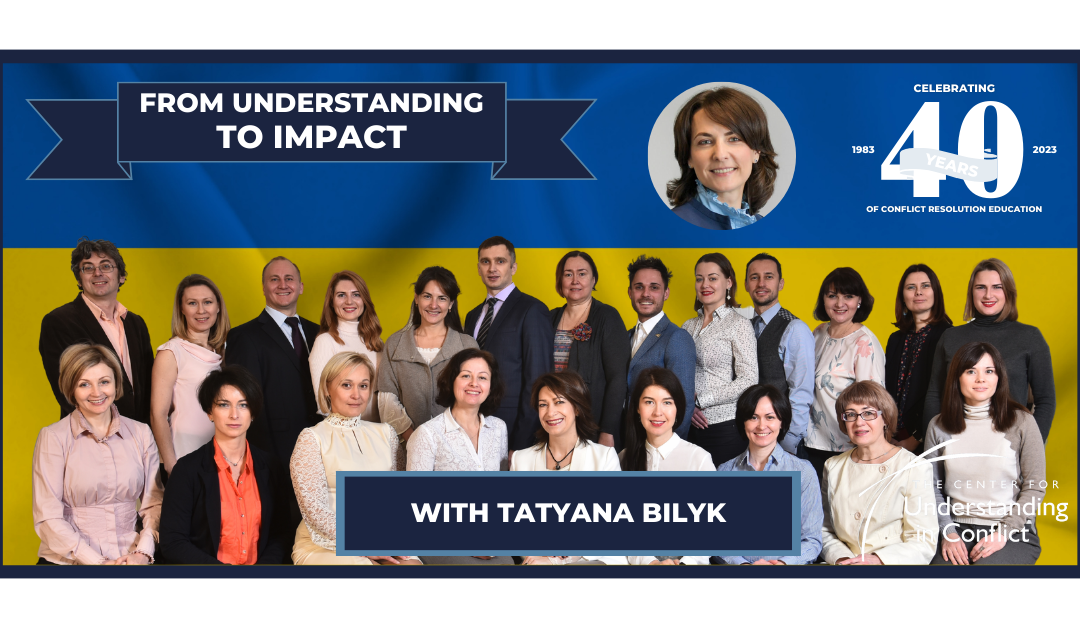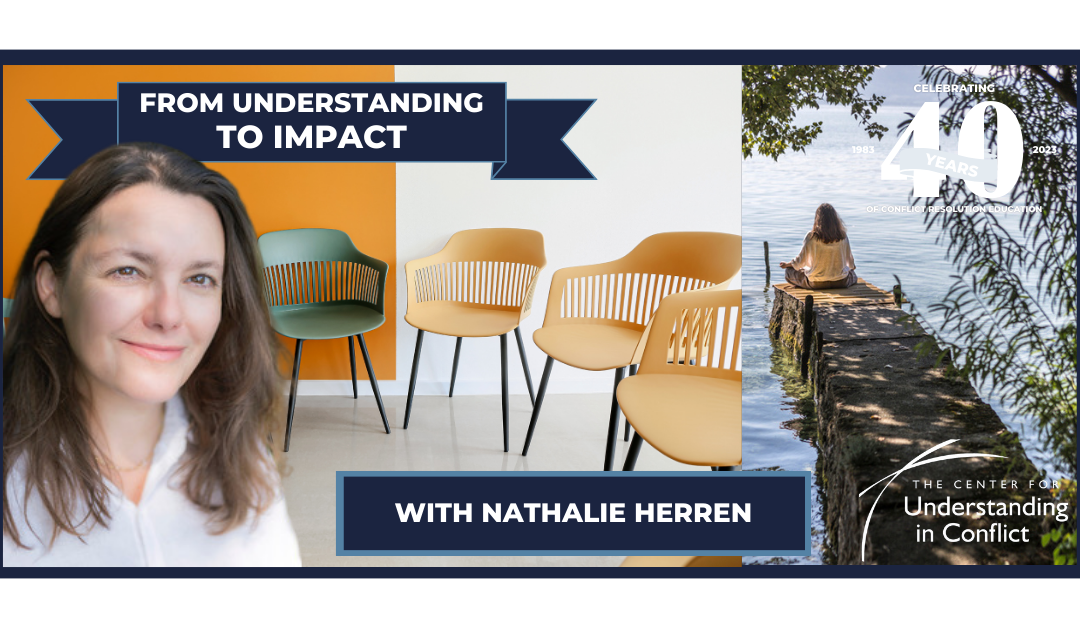
Resolving Conflict in our Communities
The Center for Understanding in Conflict, a 501(c)(3) nonprofit educational institute, has been conducting conflict resolution training to make a difference in bringing people together for over 40 years. As the understanding-based approach has grown in prominence, alongside a diverse and urgent demand to resolve conflict on multiple fronts since the close of the last decade, we look to supporters and advocates of the understanding-based model to meet the expressed need of communities looking for custom educational materials, smaller training events, scholarship opportunities, and instruction for application of the model in their personal lives.
As we look to the future, our priority is to expand accessibility, evaluate and adapt programming to meet the needs of diverse audiences and voices while working to ensure that we equip those who participate in our teaching and training programs to meet the complex demands of bringing together those in conflict across all sectors of our society, at home and abroad.
The Center for Understanding in Conflict is a charitable organization recognized as tax-exempt by the IRS under Section 501(c)(3). While we appreciate your interest in supporting our efforts to bring the understanding-based approach to conflict resolution and mediation wherever it is needed through training and professional development, please note that within the United States, we are only able to accept contributions from the following states: Arizona, California, Colorado, Delaware, Idaho, Indiana, Iowa, Montana, Nebraska, New York, South Dakota, Vermont, and Wyoming. If you would like to support the Center and reside outside these locations, please contact [email protected].

Your donation is tax-deductible within the guidelines of U.S. law. To claim a donation as a deduction on your U.S. taxes, please keep your email donation receipt as your official record. The PayPal Giving Fund will send it to you upon successful completion of your donation. We are also eligible to participate in employer gift matching through Benevity, along with several giving programs, including through the PayPal Giving Fund on eBay, Nextdoor, and HumbleBundle.
Contributions of any amount will significantly impact our ability to expand training opportunities, evolve to meet future demands, and provide pathways for those seeking to train with the Center, to whom financial concerns are a limitation.
Empowering Future Educators and Practitioners

Quelling the conflict within to guide others out: from learning to teaching on the path to understanding
Hansa Patel is an attorney, mediator, teacher, and the incoming board president at the Center for Understanding in Conflict. She was born in the United Kingdom, moved to San Francisco when she was three, and lived there her entire life before moving to Marin two years...

Ukrainian mediators work to bring understanding to conflict despite challenges faced by ongoing war
Training program encourages looking within to find a way forward NEW YORK, Dec. 2022 - When Ukrainian mediator Tatyana Bilyk approached the Center for Understanding in Conflict (CUC) about conducting training for conflict-resolution professionals still operating in a...
40 Years of Bringing Together People in Conflict Through Understanding
The Center for Understanding in Conflict, formerly The Center for Mediation in Law, was formed in 1981 by Gary Friedman and Jack Himmelstein as a non-profit educational institute dedicated to integrating mediative principles into the practice of law and resolving legal disputes in commercial, family, organizational and other legal and non-legal settings.
From 1980 – 2000 demand for conflict resolution and mediation training was predominately for lawyers and other representatives from the legal community looking to provide their clients with alternatives to court-decided outcomes. Basic 40-hour conflict resolution and mediation training programs were designed and taught to meet these needs, conducted at physical locations throughout the United States.
From 2000 – 2020, the understanding-based approach to conflict resolution caught the attention of large corporations, tech companies, universities, and NGOs who found that incorporating the model into their operations could reduce liability and expense while improving workplace culture outcomes for employees and clients experiencing disagreements and disputes. Advanced and online programs were developed in response to the unique needs of these large organizations and regularly conducted throughout the year.
The application of this approach has now expanded to collaborative practice, non-profit organizations, ombuds work, workplace disputes, and other settings in which professionals wish to help parties work through conflict differently. Beginning in 2022, we also launched a Teacher Training program to prepare practitioners to bring the model into communities of need based on attendees’ unique passions and interests, including healthcare, education, religious organizations, social movements, and community centers.


20-years of conflict resolution work breaks new ground while bringing together parties in conflict through understanding
Career practitioner champions a unique approach in Europe while training others to do the same Nathalie Herren is no stranger to conflict resolution or the challenges presented not just by those in conflict but the culture and traditions surrounding popular models of...

Barry Berkman reflects on a career spent bringing together parties in conflict and the understanding-based model’s effect on his life
After 50 years of practicing law, conflict resolution remains a powerful alternative to the court system Barry Berkman, a matrimonial lawyer, has been mediating since the 1980s. He is the founding partner of Berkman Bottger Newman & Schein LLP, with offices in...
Note: Nothing on this website shall be considered a charitable solicitation within the states of Florida, New Jersey, and Pennsylvania.

